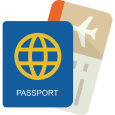Preparing for International Education
Click below to learn more about all that needs to be done before your time abroad.







Identity and Diversity

Health and Safety
The health and safety of our participants is the number one priority for the College of Southern Nevada.
Here are just a few of the resources and support services we provide for our participants:
- International Health Insurance is required for all CSN Education Abroad experiences involving travel
- Participants are required to attend a pre-experience orientation that addresses health concerns, medications, personal safety and travel tips
- All students have 24-7 emergency contacts for CSN and partner institutions
- Education Abroad enrolls all participants in the Smart Traveler Enrollment Program (STEP) to keep them connected with the local embassy and facilitate communication in the event of an emergency.
- Education Abroad regularly monitors international travel advisories and current events in our experience locations to keep students informed of relevant health or security issues.
- Education Abroad follows campus-wide emergency procedures and works closely with students and family members to address medical or other types of emergencies that may arise overseas.
- Individual advising sessions are available for students with specific health or travel concerns.
While Education Abroad is here to provide assistance, individual preparation and personal choices abroad have the greatest impact on student well-being. We encourage participants to research their host country and become familiar with health issues, environmental conditions or local customs that may affect their time overseas.
Registration and Academics
One of the benefits of taking part in international and intercultural experiences is the opportunity to become more familiar with a foreign country and culture, all the while earning academic credit! Experience the art of Italy, environmental conservation in Costa Rica, or the business in Vietnam in an immersive, experiential way!
CSN Courses Abroad
The College of Southern Nevada now offers students the opportunity to take CSN courses abroad. When looking at a CSN Faculty-Led international experience, take note of the courses offered and the number of hours. Partner with your Academic Advisor to determine how the credit could apply to your degree requirements.
Education Abroad coordinates the selection process for international experiences. Faculty leaders will provide more information on registering for the relevant CSN course.


Registration and Academics
One of the benefits of taking part in international and intercultural experiences is the opportunity to become more familiar with a foreign country and culture, all the while earning academic credit! Experience the art of Italy, environmental conservation in Costa Rica, or the business in Vietnam in an immersive, experiential way!
CSN Courses Abroad
The College of Southern Nevada now offers students the opportunity to take CSN courses abroad. When looking at a CSN Faculty-Led international experience, take note of the courses offered and the number of hours. Partner with your Academic Advisor to determine how the credit could apply to your degree requirements.
Education Abroad coordinates the selection process for international experiences. Faculty leaders will provide more information on registering for the relevant CSN course.

Mandatory Pre-Experience Orientation
Students are required to attend the mandatory Pre-Experience Orientation and there are no exceptions! These orientations are meant to provide students with critical health, safety, and logistical information, the opportunity to ask questions, and tips on navigating new cultures and the related adjustment period. Orientations also provide students with an opportunity to meet other students going abroad at the same time.
Students will also have a chance to attend a country-specific orientation. This orientation will provide more in-depth information about the host country that students will be participating in their international experience in, covering topics from expectations to departure and arrival times, packing lists, and more.
Exact dates and times of orientations will be announced each spring semester.
Passports and Visas
While a passport is not required to apply to an international program, a passport is needed to travel internationally. Already have a passport? Please make sure that you have at least six (6) months of validity remaining on it. If you do not have a passport, you need to apply for one as soon as possible.
Get started here travel.state.gov/content/travel/en/passports.html.
Passports for Non-U.S. Citizens
If you are not a U.S. citizen, you will need to make sure that you have a valid passport from your country of citizenship. If your current passport has expired or been lost/misplaced, you will need to arrange to get a new one at your nearest country embassy or consulate.
Visa
In addition to a passport, some students may need a valid visa to participate in an international experience. Consult with Education Abroad if you need a student visa and what your next steps may be. Students can also visit the U.S. State Department’s website to find country specific visa information: http://travel.state.gov/content/passports/english/country.html.
Copies of your passport and visa need to be provided to Education Abroad well in advance of your departure date.
Note: It can easily take several weeks to obtain a visa and an interview may or may not be required. Students who need a visa should apply after official acceptance to their international experience and give themselves enough time to receive the visa before their experience start date.


Passports and Visas
While a passport is not required to apply to an international program, a passport is needed to travel internationally. Already have a passport? Please make sure that you have at least six (6) months of validity remaining on it. If you do not have a passport, you need to apply for one as soon as possible.
Get started here travel.state.gov/content/travel/en/passports.html.
Passports for Non-U.S. Citizens
If you are not a U.S. citizen, you will need to make sure that you have a valid passport from your country of citizenship. If your current passport has expired or been lost/misplaced, you will need to arrange to get a new one at your nearest country embassy or consulate.
Visa
In addition to a passport, some students may need a valid visa to participate in an international experience. Consult with Education Abroad if you need a student visa and what your next steps may be. Students can also visit the U.S. State Department’s website to find country specific visa information: http://travel.state.gov/content/passports/english/country.html.
Copies of your passport and visa need to be provided to Education Abroad well in advance of your departure date.
Note: It can easily take several weeks to obtain a visa and an interview may or may not be required. Students who need a visa should apply after official acceptance to their international experience and give themselves enough time to receive the visa before their experience start date.

Student Conduct
As a student at the College of Southern Nevada, you have the unique opportunity and responsibility of acting as a college diplomat, whether you are participating in an international or intercultural experience, be it conducted in-person or virtually. It is expected you will conduct yourself in a mature manner and immerse yourself in the host culture with dignity and respect. By doing so, you will learn and share your own culture in a positive way.
During your time on your experience, you are expected to follow your host college’s expectations of conduct and are still held accountable to the CSN Student Code of Conduct.
The Rules of Conduct prohibits the following conduct:
- Acts of dishonesty, including but not limited to the following:
- Cheating, plagiarism, fraudulently obtaining grades, falsifying research data or results, assisting others to do the same, or other forms of academic or research dishonesty;
- Furnishing false information to any institution or System official, faculty member, or office
- Forgery, alteration, misuse, theft, or using without permission, any institutional document or record.
- Use, possession, or distribution of alcoholic beverages without authorization (except as expressly permitted by System or Institutional regulations, such as the Alcoholic Beverage Policy), or public intoxication. Alcoholic beverages may not, in any circumstances, be used by, possessed by, or provided to, any person under 21 years of age.
- If you are drinking alcohol under the age of 21 and/ or partaking in illegal drugs on or off campus (including other states and/or countries), and the College is made aware of the incident, you may be in violation of policies.
- Sexual Violence. Sexual violence is a severe form of sexual harassment, and refers to physical sexual acts or attempted sexual acts perpetrated against a person’s will or where a person is incapable of giving consent, including but not limited to rape, sexual assault, sexual battery, sexual coercion or similar acts in violation of state or federal law. Sexual coercion is:
- The use of violence or threats of violence against a person or the person’s family or property
- Depriving or hindering a person in the use of any tool, implement or clothing; or
- Attempting to intimidate a person by threats or force when committed with the intent to compel a person to do or abstain from doing an act that the person has the right to do or abstain from doing.
In the context of sexual misconduct, coercion is the use of pressure to compel another individual to initiate or continue sexual activity against an individual’s will. Coercion can include a wide range of behaviors, including intimidation, manipulation, threats, and blackmail. A person’s words or conduct are sufficient to constitute coercion if they impair another individual’s freedom of will and ability to choose whether or not to engage in sexual activity. Examples of coercion include threatening to “out” someone based on sexual orientation, gender identity, or gender expression and threatening to harm oneself if the other party does not engage in the sexual activity.
Please review the code in its entirety and be prepared to answer questions about it at your pre-experience orientation.
